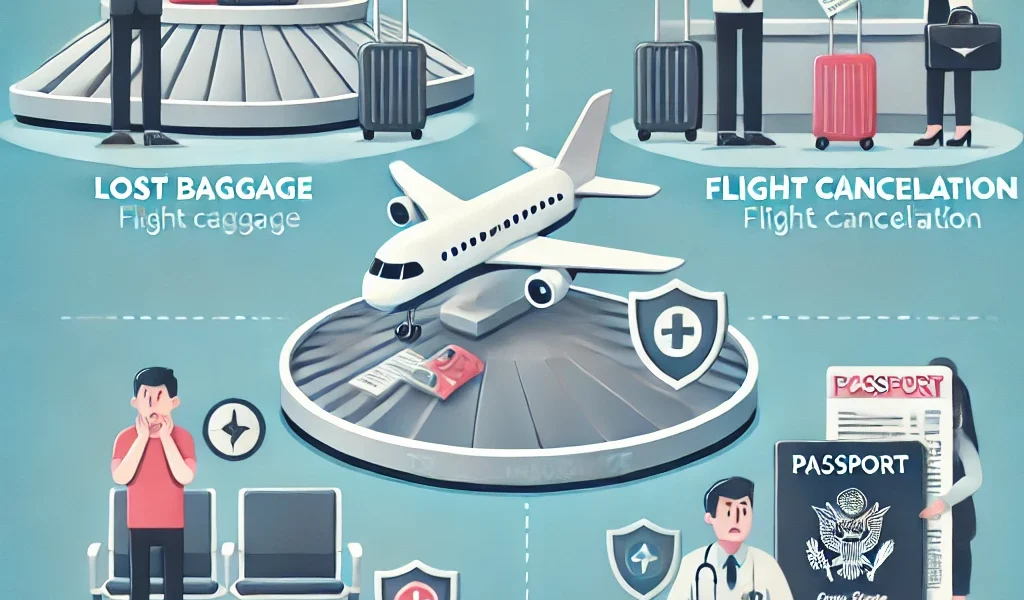Introduction
Traveling is an exciting experience, but it comes with uncertainties. From lost baggage to unexpected flight cancellations, unforeseen events can turn a dream trip into a stressful ordeal. This is where travel insurance plays a vital role in protecting you from financial losses and ensuring peace of mind.
In this guide, we will explore how travel insurance covers lost baggage, flight cancellations, and other common travel disruptions, along with tips to maximize your coverage.
Why Travel Insurance is Essential?
Travel insurance acts as a safety net, offering financial compensation and assistance for various travel mishaps, including:
- Lost, delayed, or damaged baggage
- Flight cancellations or delays
- Medical emergencies during travel
- Trip interruptions due to unforeseen circumstances
- Emergency evacuation and repatriation
With the right travel insurance policy, you can mitigate losses and focus on enjoying your journey.
How Travel Insurance Covers Lost Baggage
Baggage issues are one of the most common travel disruptions. Travel insurance can help in different situations:
1. Lost or Stolen Baggage
- If your checked-in luggage is permanently lost or stolen, the insurer reimburses you for the value of lost items.
- Coverage usually includes clothing, electronics, and essentials.
- Some policies have a per-item limit, so check policy details before purchasing.
2. Delayed Baggage
- If your baggage is delayed beyond a specified time (typically 12-24 hours), insurance covers emergency purchases such as clothes, toiletries, and essentials.
- Keep all receipts as proof to file a claim.
3. Damaged Baggage
- If your luggage is returned damaged, travel insurance covers repair or replacement costs.
- Some policies exclude fragile items, so check exclusions before traveling.
Claim Process for Baggage Issues:
- Report the issue to the airline immediately and get a Property Irregularity Report (PIR).
- Keep receipts for any emergency purchases.
- Submit a claim with your insurer, including PIR, receipts, and any supporting documents.
Flight Cancellations and How Travel Insurance Helps
Flight cancellations can happen for various reasons, including bad weather, airline strikes, and medical emergencies. Travel insurance ensures you don’t bear the financial burden.
1. Trip Cancellation Coverage
- Covers non-refundable travel expenses if you need to cancel due to unforeseen circumstances like:
- Medical emergencies (yours or a close family member’s)
- Death of a family member
- Natural disasters at the destination
- Airline bankruptcy
- Some policies cover cancellations due to work-related emergencies.
2. Trip Interruption Coverage
- Covers costs if you have to cut your trip short due to an emergency.
- Reimburses unused hotel bookings, flight tickets, and pre-paid activities.
3. Flight Delay Compensation
- If your flight is delayed for more than a specified period (e.g., 6+ hours), travel insurance covers:
- Meals and refreshments during the delay.
- Hotel accommodation if required.
- Additional transportation expenses.
Claim Process for Flight Cancellations & Delays:
- Obtain proof from the airline (cancellation/delay certificate).
- Keep receipts for any extra expenses incurred.
- File a claim with your insurer, including all necessary documentation.
Other Travel Disruptions Covered by Insurance
1. Missed Connection Coverage
- Covers extra costs if you miss a connecting flight due to an airline delay.
- Provides reimbursement for new tickets and accommodation expenses.
2. Emergency Medical Expenses
- Covers hospital bills, doctor consultations, and emergency treatments.
- Includes medical evacuation if needed.
3. Personal Liability Coverage
- Protects you against financial losses if you accidentally cause harm to a person or property while traveling.
4. Natural Disasters and Political Unrest
- Covers trip cancellations and evacuation in case of earthquakes, floods, or riots.
How to Choose the Right Travel Insurance Plan
1. Assess Your Travel Needs
- Consider destination risks (e.g., high theft areas, unpredictable weather).
- Identify what coverage is most important for your trip.
2. Compare Policies and Providers
- Look for insurers with high claim approval rates.
- Read customer reviews for service reliability.
3. Check Coverage Limits and Exclusions
- Ensure baggage coverage matches the value of your belongings.
- Understand what reasons qualify for flight cancellation reimbursements.
4. Look for 24/7 Customer Support
- Choose an insurer that offers round-the-clock assistance.
- Check if they provide emergency hotlines and multilingual support.
5. Read the Fine Print
- Pay attention to exclusions such as pre-existing medical conditions, high-risk activities, or voluntary trip cancellations.
Steps to File a Travel Insurance Claim
If you need to make a claim, follow these steps to ensure a smooth process:
- Notify Your Insurer Immediately
- Call customer service and report the issue.
- Ask about required documents for your claim.
- Gather Supporting Documents
- Airline-issued proof for flight delays, cancellations, or baggage issues.
- Medical reports and hospital bills (for medical claims).
- Receipts for extra expenses like hotel stays and meals.
- Submit Your Claim Promptly
- Most insurers have a time limit for claim submissions (e.g., 30-60 days).
- Double-check that all forms and documents are complete.
- Track Your Claim Status
- Keep copies of all communications with your insurer.
- Follow up if processing takes longer than expected.
Tips for Hassle-Free Travel Insurance Claims
- Read Policy Terms Before Traveling: Understand what is covered and what is not.
- Keep Digital Copies of Your Policy: Easily access your insurance details anytime.
- Take Photos of Your Belongings: Helps in proving the value of lost or stolen items.
- Report Incidents Immediately: Airlines and insurers require timely reporting for claim approvals.
- Save All Receipts: Essential for reimbursement claims.
Conclusion
Travel insurance is an essential investment that safeguards you from financial losses due to lost baggage, flight cancellations, and other unexpected travel disruptions. By choosing the right policy and understanding the claim process, you can travel with confidence knowing you’re protected against uncertainties.



